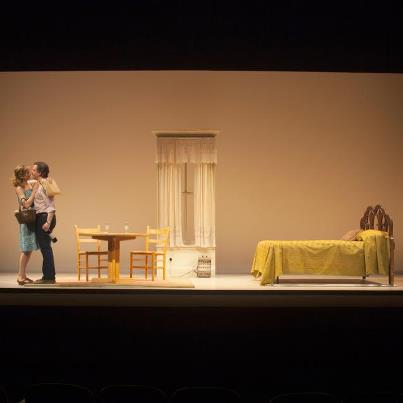by Harold Pinter
Directed by Maria Aitken
presented by Huntington Theatre Company Website
Huntington Theatre Company Facebook Page
Avenue of the Arts / BU Theatre, 264 Huntington Avenue, Boston
Nov 14 – Dec. 9, 2012
Review by Gillian Daniels
(Boston)With a plot that flows backward, a story about a long-ended affair becomes the story of how two people fell in love. Each layer of their relationship is stripped away, taking a couple who don’t seem to fit together in the least in 1977, chilly Emma (Gretchen Egolf) and the befuddled Jerry (Alan Cox), and re-framing them to reveal who they really are and what they used to be.
Despite the inverted plot structure, Harold Pinter’s dark comedy, Betrayal, is in all other ways the basic adultery narrative. It’s difficult to say the material has been well-visited, though, as it came out in 1978 and is considered a cultural touchstone. The 1997 Seinfeld episode, “The Betrayal,” for example, borrows both the play’s name and the backwards chronology for one of its strangest shows.
Like Seinfeld, Pinter’s characters are basically selfish, even when it comes to the cuckolded Robert (Mark H. Dold). Egolf’s supposedly cold Emma melts into a complex ball of insecurities as the show progresses, the actress excavating seemingly impenetrable layers to reveal the soul beneath. Cox, as Jerry, is delightful to watch as he sheds years of middle-aged fog so the audience can get a peak at exactly the sort of person who would start an affair with his best friend’s wife. Robert, meanwhile, reveals that he is not quite the clueless cuckold people would assume he is. His acceptance of the situation,
when he discovers it, gives Dold an unbelievable, otherworldly air of Zen.
Director Maria Aitken takes full advantage of the space the stage provides. Through creative use of projected title cards, music, and props, the years convincingly rewind for the three main characters of the show. Watching the costumes change, from Emma in a sturdy three-piece suit to a summer dress, makes the show feel more sure of the foot it has in reality.
The play’s structure remains its strongest conceit. As mentioned, a pair of characters falling out of love, in reverse, turns a story of adultery into a more traditional romance. It makes the subject matter more palatable, maybe less bitter. Sometimes funny, more often sad, and always nostalgic, The Huntington Theatre Company’s Betrayal is an entrancing drama.

